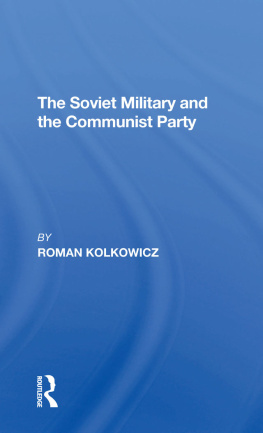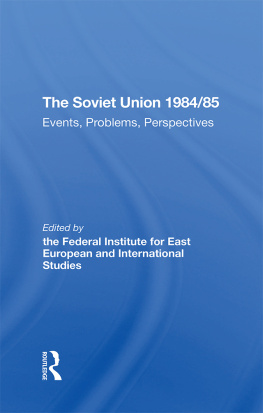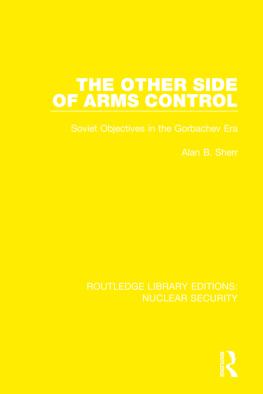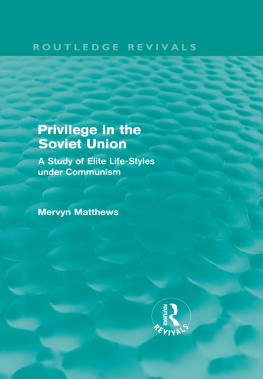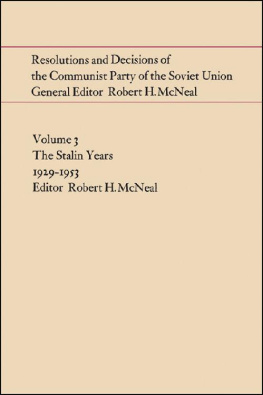Acknowledgments
This book has been a long time in the making. My interest in the place of music in Soviet society was sparked by my first visit to the then collapsing Soviet Union in the summer of 1990 under the auspices of a language instruction exchange between the University of Arizona and Leningrad State University. As I took advantage of what to me were shockingly low ticket prices for world-class orchestral and operatic performances night after night, I was struck by the prominent and important place that such music held for the large, multigenerational audiences in attendance, night after night. I wasnt in Arizona anymore. A few years later, when I had the good fortune to enter the History Department at the University of Chicago, I had the opportunity to investigate that phenomenon more systematically. This study of the Soviet music profession is the end result.
In the years since, I have accumulated many debts of gratitude. Intellectually, academically, and professionally, I am most indebted to the incomparable Sheila Fitzpatrick, whose critical but unflagging support for me and the project has meant the world to me. Her scholarship stands on its own, but her legacy includes the astonishing breadth of her selfless mentorship. The intellectual diversity and rigorous intensity of her community of students is inspiring, and I count myself lucky to have been part of it. My work and my approach to Russian history also benefited immeasurably from the attention, criticism, support, and varying points of view provided by Ron Suny, Richard Hellie, and Larry Zbikowski, to whom I am very grateful. My time in Chicago was also enriched by my friendship with Barbara Schubert, to whom I am thankful for always keeping music on the front burner.
This project gestated in the fertile environment at the University of Chicago created by Sheila Fitzpatrick, Richard Hellie, and Ron Suny at the Russian Studies Workshop. Chicagos workshop system provided the forum for presentations of many chapters of this book, and the people at those workshops provided many examples of accomplishment and pushed me to improve my work. The cohort that was finishing when I arrived first intimidated and theninspired me, and their tales of Soviet archival successes and frustrations served as guides for my own experiences later on. The cohort with whom I went through the Chicago program continued to challenge me while providing the friendship that helped sustain me through the process. Informal discussions over beer after workshops helped form my approach as a historian. So thank you to the Chicago crowd, in particular Terry Martin, Matthew Payne, Julie Hessler, James Harris, Golfo Alexopoulos, Matthew Lenoe, Steven Richmond, Jonathan Bone, Joshua Sanborn, Julie Gilmour, Christopher Burton, Stephen Bittner, the late Jenifer Stenfors, whose memory lives on in the hearts of those who knew her, Michael David, Steven Harris, Charles Hachten, Mark Edele, Christine Haynes, James Bjork, Wendy Norris, Melissa Feinberg, Paul Hanebrink, and especially Alison Smith.
I was also fortunate to spend research trips in Russia with an amazingly gifted, supportive, and tight-knit group of scholars. Exploring Moscow, the archives, and the contours of Russian history together was a joy and privilege. On a weekly basis, over donuts, they encouraged me to continue thinking about the big picture while I was working with the minutiae of archival sources. I extend my appreciation to all of them, but I must single out Frank Grner and Ethan Pollock, with whom I grappled with postwar Stalinism, and my roommates at the Sportivnaia place, with whom I shared not just my apartment but my excitement, frustrations, and sometimes arguments about daily life in the archives: Brian Kassof, Steven Harris, James Harris, and especially Michael David. That daily life was made immeasurably more comfortable and productive by the tireless efforts of the archival staff in each of the archives in which I worked. Their professionalism under always adverse circumstances is inspirational, but I extend particular appreciation to the reading room staff at the Russian State Archive of Literature and Art: Elena Ermilovna Gafner, Irina Iur evna Zelenina, and Irina Vadimovna Upadysheva. Many thanks also to Elena Drozdova and Leonid Weintraub, who first provided visa support and have since become friends.
I also thank those composers and Composers Union administrators (especially Tikhon Nikolaevich Khrennikov, Rodion Konstantinovich Shchedrin, and Alla Semenovna Sedova) who were kind enough to share their experiences with me in personal conversations, sometimes briefly and sometimes over repeated meetings. Memories of my weekly visits to the Moskovskii muzykal nyi klub will always remind me of the passion with which Muscovites are drawn to their citys rich musical offerings, and I will be forever indebted to its director, Grigorii Samuilovich Frid, a warm, inviting, extremely thoughtful, and all-around wonderful man, for his willingness to extend his hospitality and share his insights about musical life under Stalin.
Funding for the research was provided by a Fulbright-Hays Doctoral Dissertation Abroad Fellowship, for which I will always be thankful, and by the University of Chicago. Dean of Graduate Education Lois Steins flexibility and understanding proved invaluable. Funding and much appreciated time for writing were provided by the Academic Senate and Center for Ideas and Society atthe University of California, Riverside. My colleagues at UCR have provided a most supportive environment for a junior faculty member, for which I am very thankful. Special appreciation is due to Thomas Cogswell and Sharon Salinger.
Earlier drafts of all or parts of chapters 6, 9, and 10 were presented to the Russian Studies Workshop at the University of Chicago. An early version of chapter 3 was presented to the University of Chicagos Modern European History Workshop. A draft of chapter 4 was presented at the conference Stalins Last Decade, held in Chicago in March 2000, and a first version of chapter 10 was presented to the PEECS NTNU International Workshop Patronage under Social-Democracy and State Socialism: A Comparative Study of Academic and Artistic Life in Scandinavia and Eastern Europe, which was held in Trondheim-Brekstad, Norway, in August 1999. It was published as Most Respected Comrade...: Patrons, Clients, Brokers and Unofficial Networks in the Stalinist Music World, Contemporary European History 11, no. 1 (2002): 3365 (c) 2002 Cambridge University Press, here reprinted with permission. An earlier version of chapter 5 was presented to the Midwest Russian History Workshop meeting in Chicago, October 2000. Finally, two different versions of all or part of chapter 7 were presented at the National Convention of the American Association for the Advancement of Slavic Studies in Boca Raton, Florida, September 1998, and at the Midwest Conference of Modern Russian Historians meeting in Columbus, Ohio, October 1998. I am grateful to all of the participants of these workshops and conferences for their constructive criticism and stimulating discussion. I am particularly indebted to the discussants who spent extra time preparing thought-provoking and challenging comments: Christine Haynes, Michael David-Fox, and Gyrgy Peteri. I also thank John G. Ackerman at Cornell University Press for his interest in the project, his judiciousness during the acquisitions process, and his insightful editorial suggestions. Thanks also to the anonymous readers for the Press for their encouraging praise, perceptive critiques, and useful recommendations. Their efforts significantly improved the manuscript.


